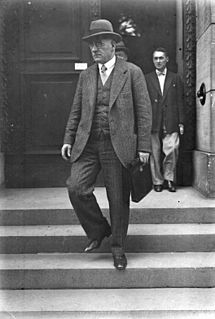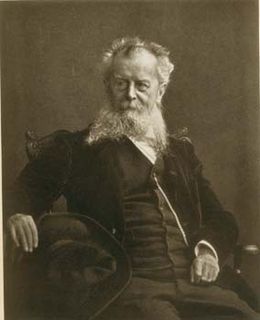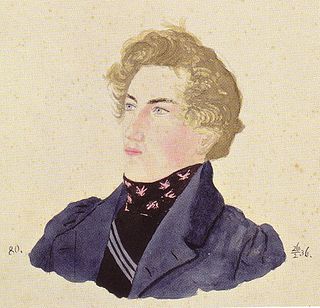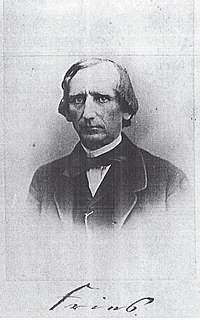
Robert von Keudell (27 February 1824 - April 25/26 1903) was a German diplomat, politician and music lover.

Robert von Keudell (27 February 1824 - April 25/26 1903) was a German diplomat, politician and music lover.
Von Keudell's parents were the Prussian major Leopold von Keudell (1769-1831) and his wife Wilhelmine von Hartmann (1789-1848). He was born in Königsberg. Keudell studied law at the Albertina University in Königsberg.
Keudell was an excellent pianist and admirer of Robert Schumann, with whom he corresponded from 1847 to 1853. His two wives were also talented pianists. His second wife played with Joseph Joachim and Anton Rubinstein, among others. In 1839-1840 he had become acquainted with Fanny Hensel in Italy and had encouraged her composition. [1]
From 1872 to 1873 he was German envoy at the Sublime Porte in Constantinople. In 1873 he became envoy to the Quirinal in Rome and - as a result of the embassy upgrading from 1876 - German ambassador in Italy (until 1887). As a member of the Free Conservative Party he sat in the Reichstag in 1871/72 and from 1890 to 1893. From 1870 to 1872 and again from 1889 to 1893 he was a member of the Prussian House of Representatives. [2] He was a close friend of the German Chancellor Otto von Bismarck.
Robert von Keudell married on February 1, 1870 Hedwig Louise von Patow (1842–1882), a daughter of the politician Robert von Patow. After the death of his first wife, he married Alexandra von Grünhof (1861–1933), daughter of the Duke Ernst von Württemberg (1807–1868) They had three children together:
Robert von Keudell died on April 25/26 1903 in Chojna.

Fanny Mendelssohn was a German composer and pianist of the early Romantic era who was also known as Fanny (Cäcilie) Mendelssohn Bartholdy and, after her marriage, Fanny Hensel. In addition, she was referred to as Fanny Mendelssohn Hensel. Her compositions include a piano trio, a piano quartet, an orchestral overture, four cantatas, more than 125 pieces for the piano, and over 250 lieder, most of which went unpublished in her lifetime. Although praised for her piano technique, she rarely gave public performances outside her family circle.

Otto Braun was a German Social Democratic politician who served as Prime Minister of Prussia for most of the time from 1920 to 1932. After the Nazis seized power in 1933, Braun went into exile in Switzerland.

Felix Dahn was a German law professor, German nationalist author, poet and historian.

Eduard Julius Friedrich Bendemann was a German-Jewish painter.

Eduard Ernst Friedrich Hannibal Vogel von Fal(c)kenstein was a Prussian General der Infanterie.

The Mendelssohn family are the descendants of Mendel of Dassau. The German Jewish philosopher Moses Mendelssohn and his brother Saul were the first to adopt the surname Mendelssohn. The family includes his grandson, the composer Felix Mendelssohn and his granddaughter, the composer Fanny Mendelssohn.

Otto Roquette was a German author.

The Reichstag was the Parliament of the North German Confederation, founded after the Austro-Prussian War of 1866. It functioned until the establishment of the German Empire in 1871. Parliamentary sessions were held in the same building as the Upper House of the Prussian Landtag, the Prussian House of Lords, located at 3 Leipziger Straße in Berlin, Germany. The same location is now the home of the German Federal Bundesrat.

Walter von Keudell was a German forest expert and politician. He served as interior minister of Germany between 1927 and 1928 during the period of the Weimar Republic.
Thomas Kühne is a German historian. He holds the Strassler Chair for the Study of Holocaust History and is the Director of the 'Strassler Center for Holocaust and Genocide Studies' at Clark University, Massachusetts. His Research and teaching focuses on genocides and wars in modern European history, especially on Holocaust perpetrators and bystanders; he also engages in the study of masculinities and of body aesthetics.
Heinrich Johann Kampschulte was a German Roman Catholic priest, Catholic Centre Party politician and an historian.

Adolf Hermann Wilhelm Hagen was a public official in Prussia. He was also a banker and a liberal politician.
Otto Bähr was a German legal scholar and liberal parliamentarian.

Otto Saro was a Prussian lawyer who in 1879 or 1880 became the chief state prosecutor in Königsberg. He was also a Conservative politician, serving as a member of the Imperial Reichstag (parliament) between 1878 and his death ten years later.

Alfred Cuno Paridam Freiherr von dem Knesebeck-Milendonck was a soldier, landowner and member of the Prussian House of Representatives and the Reichstag of the North German Confederation.

Hugo Friedrich Fries. sometimes spelt Frieze, was a German judge, and son of Jakob Friedrich Fries. Before and after the founding of the German Reich, he was a member of the Reichstag. His son, Otto Fries (1849–1905), a forester, was also a member of the Reichstag.
Moritz Baerwald was a German lawyer and politician of the German Democratic Party, a member of the Prussian House of Representatives and the Weimar National Assembly.

Hermann Haken was a lawyer and politician, most notable as a lord mayor of city of Stettin, Kingdom of Prussia, German Empire. During his 29-year term in office lasting from 1878 to 1907, he developed Stettin into a modern city and one of the most important industrial and port cities in the region of Baltic Sea.